RESEARCH OBJECTIVES
Physical education is one of the eight Key Learning Areas (KLAs) of the Hong Kong school curriculum. Quality Physical Education (QPE), as defined by UNESCO (United Nations Educational, Scientific and Cultural Organization), should provide active and inclusive learning experiences in physical domains, with an aim to support the development of students’ physical, social, and emotional skills. Led by Professor Amy HA, the primary focus of the Sport Pedagogy & Physical Activity Assessment Laboratory is to promote QPE through quality research and community projects. Our work encompasses the study of teaching and learning, application of information technology in physical education, the design and implementation of school- and family-based interventions, and teacher professional development. Through the application of evidence-based practices, we are determined to cultivate a positive and supportive environment in school and home settings that enhances the physical literacy of individuals at all ages.  |
|
|
Sport Pedagogy & Physical Activity Assessment Laboratory Research Group: left to right (1st row) Mr Chun-ming YAM, Mr Ka-chun SO, Mr Chi-wing WONG, Professor Amy HA (Head of the research group), Mr Tze Hin KWAN, Mr Yiu-fai YU, Dr Johan NG (2nd row) Ms Lok-yiu SIU, Dr Taoran ZENG, Ms Ying HUANG, Dr Juanita CHEUNG, Dr Cecilia CHAN, Ms Genevieve YUNG, Ms Sophie FUNG |
STATE-OF-THE-ART METHODS OF PHYSICAL ACTIVITY MEASUREMENT
The measurement of physical activity, both in terms of quantity and quality, is a critical part of assessing one’s performance and evaluating the effectiveness of interventions. In our research projects, we applied state-of-the-art approaches to tackle existing issues in physical activity measurement and developed innovative methods to overcome methodological obstacles. For example, we use the proximity feature of research-grade accelerometers to measure co-physical activity between parents and their children. We have also developed an algorithm to detect the body location in which devices are attached to the participant.
Inspired by STEM (Science, Technology, Engineering, and Mathematics) education and the MVPA60 campaign led by the Department of Health and the Education Bureau, we created an eco-system to measure a vast pool of students’ and parents’ day-to-day moderate-to-vigorous physical activity (MVPA) levels under the Fun to Move@JC Project (see below). Within this eco-system, we developed both hard- and software to allow automatic uploading of students’ physical activity data to our cloud servers. Furthermore, we developed a software that collects and grades fundamental movement skills of students using 3D motion cameras. By collecting students’ quantity and quality of movement behaviors over time, we could study in depth how these factors are interrelated, and how they contribute to students’ health and well-being.
SCHOOL- AND FAMILY-BASED INTERVENTIONS AND THE PROMOTION OF SCHOOL-FAMILY PARTNERSHIP
As an experienced educator herself, Professor Ha firmly believes that it is vital to engage relevant stakeholders (e.g. policy makers, school principals, teachers, parents, and family members) in initiatives to improve children’s health-related PA participation and engagement in PE. As such, we have designed, implemented, and evaluated numerous school- and family-based physical activity interventions. The SELF-FIT project promotes fitness activities and MVPA during school physical education by adding game-like elements to lessons. Results in favor of the intervention was found in the initial study. A scale-up study is currently in progress to promote key components of the project to up to 100 local schools. In the Active 1+FUN project, students and parents participated in bi-weekly workshops and activity sessions where they were provided with knowledge in terms of physical activity and tenets of psychological theories that would benefit parenting practices and students’ motivation. This innovative approach was well-received by participants, and they showed improvements in measured outcomes after attending the workshops and activity sessions.
To further highlight the importance of parents as key stakeholders to their children’s behaviors and well-being, Professor Amy HA is also leading a 5-year initiative to promote school-family partnership in terms of students’ physical activity behaviors. The Fun to Move@JC Project is a five-year pilot project funded and co-created with The Hong Kong Jockey Club Charities Trust. The project aims to develop a sustainable model that enhances primary students’ physical activity level, as well as improving their efficacy and motivation in sports. The project involves cross-disciplinary research and collaboration between researchers and industry leaders in information technology. Data generated from this project will serve as important reference to children’s development in the physical domain for both academia and policy-makers.
CAPTURING THE PHYSICAL LITERACY JOURNEY OF INDIVIDUALS ACROSS GENERATIONS
Physical literacy is a concept that encompasses the motivation, confidence, knowledge, and engagement in physical activity. Being physically literate enables one to be physical active throughout the lifespan. To better understand how physical literacy of individuals is developed, we are also interested in the movement behaviors of the early-age and elderly population. For example, our team is a part of the SUNRISE study that examines movement behaviors of preschool-aged children across the globe. We have also developed interventions for children in kindergartens and their parents. To examine intergenerational influences, we are currently conducting a study to investigate how grandparenting behaviors and daily routines might impact physical activity behaviors of the elderly. Through these studies, we hope to identify important facilitators or inhibitors of physical activity across age groups.
TEACHER EDUCATION AND PROFESSIONAL DEVELOPMENT
Improving teachers’ instruction is an important step in enhancing students’ learning experience in physical education. We aim to promote student-centered approaches through regular teacher professional development workshops under aforementioned research and community projects. In particular, we advocate the application of the SAAFE (Supportive, Active, Autonomous, Fair, and Enjoyment) principle, which was grounded in contemporary psychology theory. We also lead a teacher community to support physical education teachers’ instruction via online modes. We jointly developed e-learning materials with in-service teachers, which are shared with the community through a digital sharing platform.
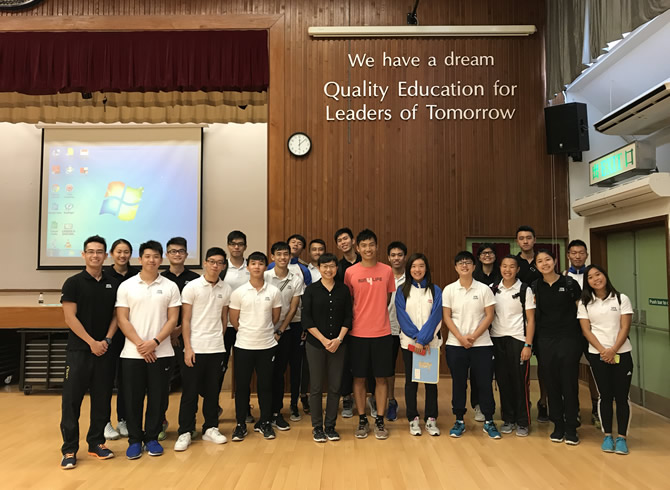 |
|
| Professor Amy Ha and her undergraduate students at a school visit. | |
 |
 |
| Workshops specifically designed to strengthen PE teachers’ continuing professional development. | |
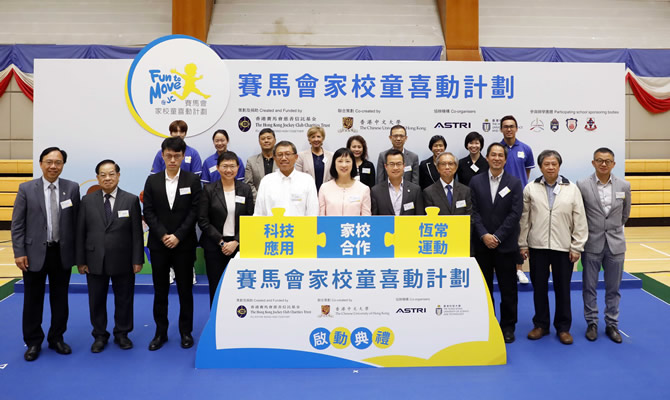 |
|
| Director of Leisure and Cultural Services Ms Michelle Li (in the middle), Vice-Chancellor and President of the CUHK Professor Rocky Tuan, Executive Director, Charities and Community of the HKJC Mr Leong Cheung and Principal Investigator Professor Amy Ha, attended the Launch Ceremony for the Fun to Move@JC project. | |
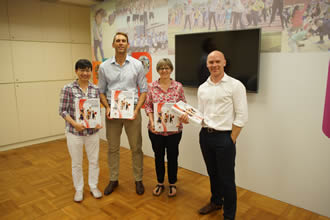 |
 |
 |
 |
| Professor Amy Ha’s research team builds ties with scholars from international universities for knowledge exchange and experience sharing. | |
 |
 |
| Different initiatives including technology applications were introduced to improve the fundamental movement skills (FMS) of students from kindergartens and primary schools. | |
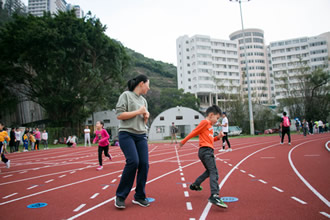 |
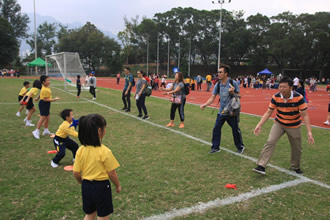 |
 |
 |
 |
|
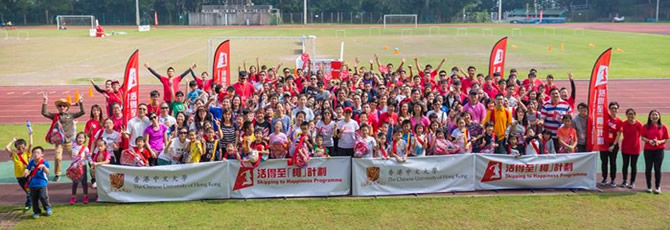 |
|
 |
|
| Professor Amy Ha led school-family-cooperating projects to promote healthy lifestyle and physical activity behaviors in children and their parents. | |
 |
|
| Professor Amy Ha, founder and President of the Hong Kong Rope Skipping Association, China, and Hong Kong delegates at the Asian Rope Skipping Championships, 2019. | |
BRIEF PROJECT TITLES:
- Increasing students’ involvement and enjoyment in physical activities through fitness infusion and creating an autonomy supportive learning environment
- Promoting physical activity in children through family-based intervention: The “Active 1+FUN” randomized controlled trial
- The validation and calibration of accelerometer-based activity monitors' output for the measurement of physical activity
- Promoting physical activity in primary schoolchildren through family-school support and state-of-the-art technology: a social ecological approach
- Promoting physical and health literacy in Hong Kong preschool teachers, children and their families
- Investigating schoolchildren’s fundamental movement skills, perceived physical competence and exercise enjoyment
- Does autonomous motivation predict moderate-to-vigorous physical activity and psychological well-being in Hong Kong schoolchildren?
- Active Hong Kong, Healthy Citizens – A family-based physical activity, fundamental movement skill, and nutrition program
- Impact of rope skipping on health-related fitness, fundamental movement skills, bone mineral density, and academic performance in Hong Kong Chinese pre- and early-pubertal girls: A quasi-experiment
- Increasing Hong Kong Chinese students’ physical activity through fitness infusion and an autonomy supportive learning environment: Evaluation of the SELF-FIT program using a clustered randomized controlled trial
- Increasing Hong Kong primary children's fundamental movement skills through an assessment -based teacher led intervention using a clustered randomized controlled trial
SPORT PEDAGOGY & PHYSICAL ACTIVITY ASSESSMENT LABORATORY RESEARCH GROUP
Professor Amy HA Ph.D. (夏秀禎)
Associate Dean (research) and Professor
Teacher Education,
Sports and Physical Activity,
Professional Development
sauchingha@cuhk.edu.hk
3943 6083
Associate Dean (research) and Professor
Teacher Education,
Sports and Physical Activity,
Professional Development
sauchingha@cuhk.edu.hk
3943 6083
Dr Johan NG Ph.D. (吳又言)
Scientific Officer
Research interests: Sport and Exercise Psychology,
Motivation to physical education and physical activity
yyng@cuhk.edu.hk
3943 6098
Scientific Officer
Research interests: Sport and Exercise Psychology,
Motivation to physical education and physical activity
yyng@cuhk.edu.hk
3943 6098
Dr Cecilia CHAN Ph.D. (陳凱詩)
School Development Officer II
Research interests: PE Pedagogy,
Teaching and Assessment of Fundamental Movement Skills
ceciliachanhs@cuhk.edu.hk
3943 9440
School Development Officer II
Research interests: PE Pedagogy,
Teaching and Assessment of Fundamental Movement Skills
ceciliachanhs@cuhk.edu.hk
3943 9440
Dr Qing HE Ph.D. (何青)
Postdoctoral Fellow
Research interests: Physical Activity,
Fundamental Movement Skill Development in Children
qinghe@cuhk.edu.hk
3943 9440
Postdoctoral Fellow
Research interests: Physical Activity,
Fundamental Movement Skill Development in Children
qinghe@cuhk.edu.hk
3943 9440
Dr Taoran ZENG Ph.D. (曾陶然)
Postdoctoral Fellow
Research interests: Motivation and well-being
trzeng@cuhk.edu.hk
3943 6098
Postdoctoral Fellow
Research interests: Motivation and well-being
trzeng@cuhk.edu.hk
3943 6098
Mr JJ LAI Ching-pong (黎正邦)
Junior Research Assistant
TBC
3943 6098
Junior Research Assistant
TBC
3943 6098


